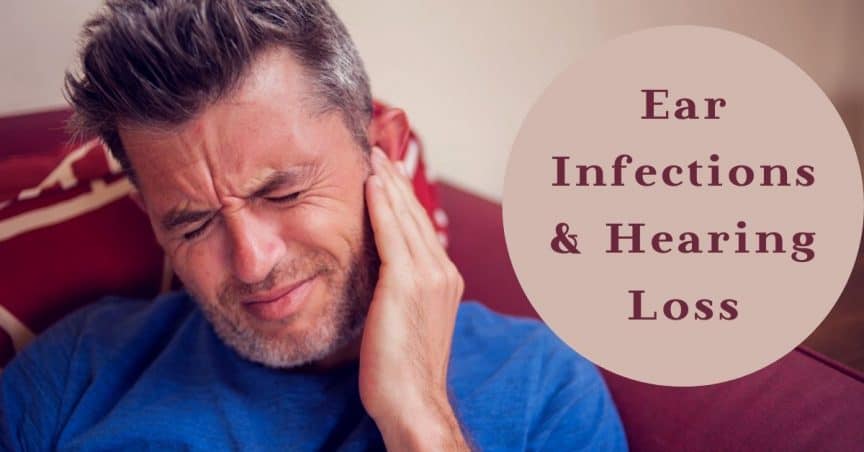- The Emotional Journey of Accepting Hearing Loss - October 25, 2024
- Making a Style Statement with Hearing Aids This Fall - October 15, 2024
- Fireplace Safety and Hearing aids - October 4, 2024
An ear infection is a painful swelling or inflammation in the ear, accompanied by a buildup of fluid in the ear canal or middle ear. Kids have ear infections more often than adults, but people of all ages can suffer from an ear infection. If you have an ear infection, you’ll notice a sudden decrease in your ability to hear, and you may be worried this hearing loss might be permanent. Here’s everything you need to know about ear infections and hearing loss.
What Causes Ear Infections?
Ear infections can be either in the ear canal or in the middle ear. An ear infection in the ear canal is called otitis externa, or swimmer’s ear. This ear infection is caused by bacteria that ends up in the ear after a long day swimming in a lake or pool.
Otitis media, or a middle ear infection, often follows on the heels of a cold, allergic reaction, or nasal infection. The swelling of the throat and nasal passages effects the eustachian tubes. These tubes connect the middle ear to the back of the throat, and drain any harmful fluid that may build up in the inner ear. During a head cold, the fluid not drain properly, and buildup in the middle ear, leading to a painful infection.
Signs that you have an ear infection include:
- Pain or pressure in the ear
- A feeling of fullness in the ear
- A discharge from the ear
- Hearing loss in the ear
- Vertigo, dizziness, or difficulty walking
- Nausea
Ear Infections and Hearing Loss
When you have an ear infection in either the ear canal or middle ear, you’ll experience hearing loss. As fluid fills up the ear canal, sound waves won’t be able to travel down the ear canal to the middle and inner ear. If you have a middle ear infection, the fluid and swelling will make it impossible for the ossicles, or tiny bones in the middle ear, to transmit the soundwaves to the inner ear. In both cases, you’ll experience hearing loss in the effected ear.
Usually, this hearing loss is very sudden, and will rapidly get worse. You may have a stuffed or full feeling in the ear, experience a painful buildup of pressure, and feel as though the sounds around you are extremely muffled or garbled.
The good news is that once the ear infection clears up, hearing usually returns to normal. As the fluid drains and the inflammation is reduced, sound waves will be able to travel down the ear canal, vibrate against the ear drum, and be transmitted to the inner ear.
Chronic Ear Infections
Most people will never have an ear infection, or will only have an ear infection once. However, ear infections may become chronic, and some people will suffer from many ear infections in their lives. Complications from repeated ear infections can lead to more severe hearing problems, and even permanent hearing loss, as the bacteria does more permanent damage to the lining of the ear canal, or to the structures in the middle ear.
Treating Ear Infections
The first line of defense against ear infections are antibiotics. Your doctor will prescribe either antibiotic drops you can put directly into your ear, or oral antibiotics you’ll need to swallow. These will clear up the ear infection in just a few days, destroy the harmful bacteria, and allow the excess fluid to drain from the ear.
Those suffering from chronic ear infections may need a more rigorous treatment approach, and doctors usually recommend inserting a small tube in the ear drum to help fluid drain from the ear, and reduce the risk of another ear infection.
Treating Hearing Loss
If you’ve suffered a hearing loss due to an ear infection, you can treat your hearing loss with hearing aids. Our hearing center has plenty of options for you. Choose between an ergonomic behind the ear device, or a nearly invisible in the canal hearing aid, and hear all the sounds you’ve been missing. Today’s hearing aids can be connected to your smartphone, and controlled from the palm of your hand for easy and discreet adjustments. Maintaining your hearing with hearing aids is the best way to prevent further hearing loss, and make sure you’re enjoying a wonderful quality of life with clear hearing.

